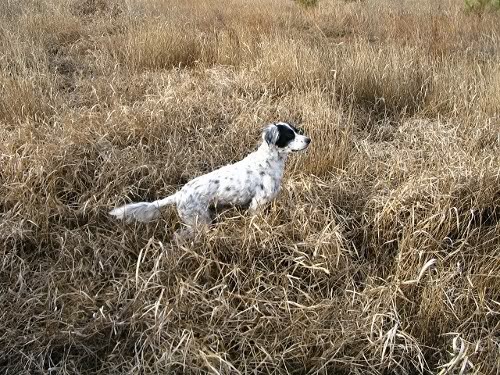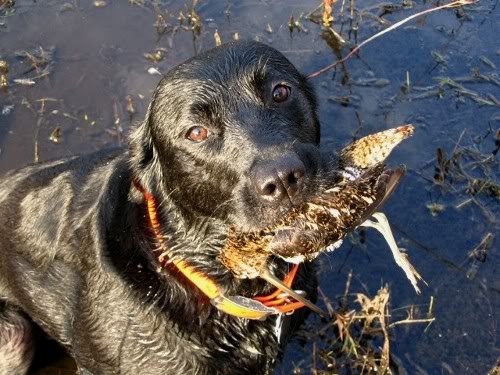I suppose before we decide on the breed we want or need we must first decide which type of dog to use when hunting snipe. I think for most of the conditions under which snipe are hunted we can rule out flushing dogs. I have nothing against them and they certainly have their role in bird hunting, but I don't believe for most situations they are the best choice when snipe hunting. That leaves the pointing dogs, versatile dogs, and retrievers. While there are crossover uses for many dogs that fall within those parameters each type generally has its own strong points and weaknesses. Of course these are generalities and there are exceptions to every rule.
First we should decide if we need one of the pointing breeds. In my opinion they are the least useful of the remaining choices. That doesn't mean I don't like them. In fact, they are my favorite group of dogs. The problem is that they were not intended to be what a good snipe dog should be. I think any positive attributes they have would also be attributed to any of the versatile breeds. If a pointing dog was chosen I think a close working dog would be a better choice than a big running dog, at least where I hunt. Some are good natural retrievers but on average I would have to give the advantage in that department to both the versatile dog and the retriever. It is my contention that finding and/or retrieving snipe that have been shot is at least as important as finding birds to shoot.

What is it that would make a versatile dog a better choice than a pointing dog? I believe it is because on average it is easier to make better retrievers out of the versatile dogs. There will always be exceptions but since I am generalizing I prefer to go with the law of averages. Will a versatile dog be a closer working dog? Again, on average I believe they will, not that a bumped bird at seventy-five yards is any better than one bumped at one hundred or one hundred-fifty yards. For the best all-around snipe dog your best choice is probably a versatile breed.
Our last choice is the retrievers. Let's rule out pointing Labs or other specialized training or breeding. I am talking about one of the retriever breeds chosen strictly to find and retrieve dead or crippled birds. For me this would be the most useful type of dog for hunting snipe. Their advantage at retrieving is a given but I think it might be even more important that they are easily kept at heel instead of working out in front attempting to locate birds. And, there is a chance that a retriever might catch the scent of and alert a hunter of a tight sitting birds in thicker cover that you might otherwise walk past. For me that would be an added bonus. Couple finding dead or crippled birds on land with the ability and desire to retrieve from water and my choice of a retriever as the most useful snipe dog is an easy one to make.
Now that I have chosen a type I have to select a breed. Personally, I would prefer a dog smaller than the most common retrievers, the Labrador and Golden. Why? Because my dogs are family pets that live in the house. A Lab isn't too big for a house dog and many are house dogs, but if given a choice I would like something smaller. However, they are strong dogs that can push through areas with high grass, some of which are flooded, without getting easily fatigued. They are also the most common hunting dog so finding one from good hunting stock is about as easy as buying a new pair of blue jeans. Another feature I like about the lab is the short, straight hair. The few times I have taken my Setter was enough for me to know that long hair and mud were not made for each other. Do the benefits of a Lab outweigh any liability the large size might be? Yes they do, and if you are also a waterfowl hunter like many snipe hunters the Lab will be the best double duty dog you could have. So, that is my choice for the best all-around snipe dog. Depending on what you feel you need in a dog it might or might not be the best choice for you.



